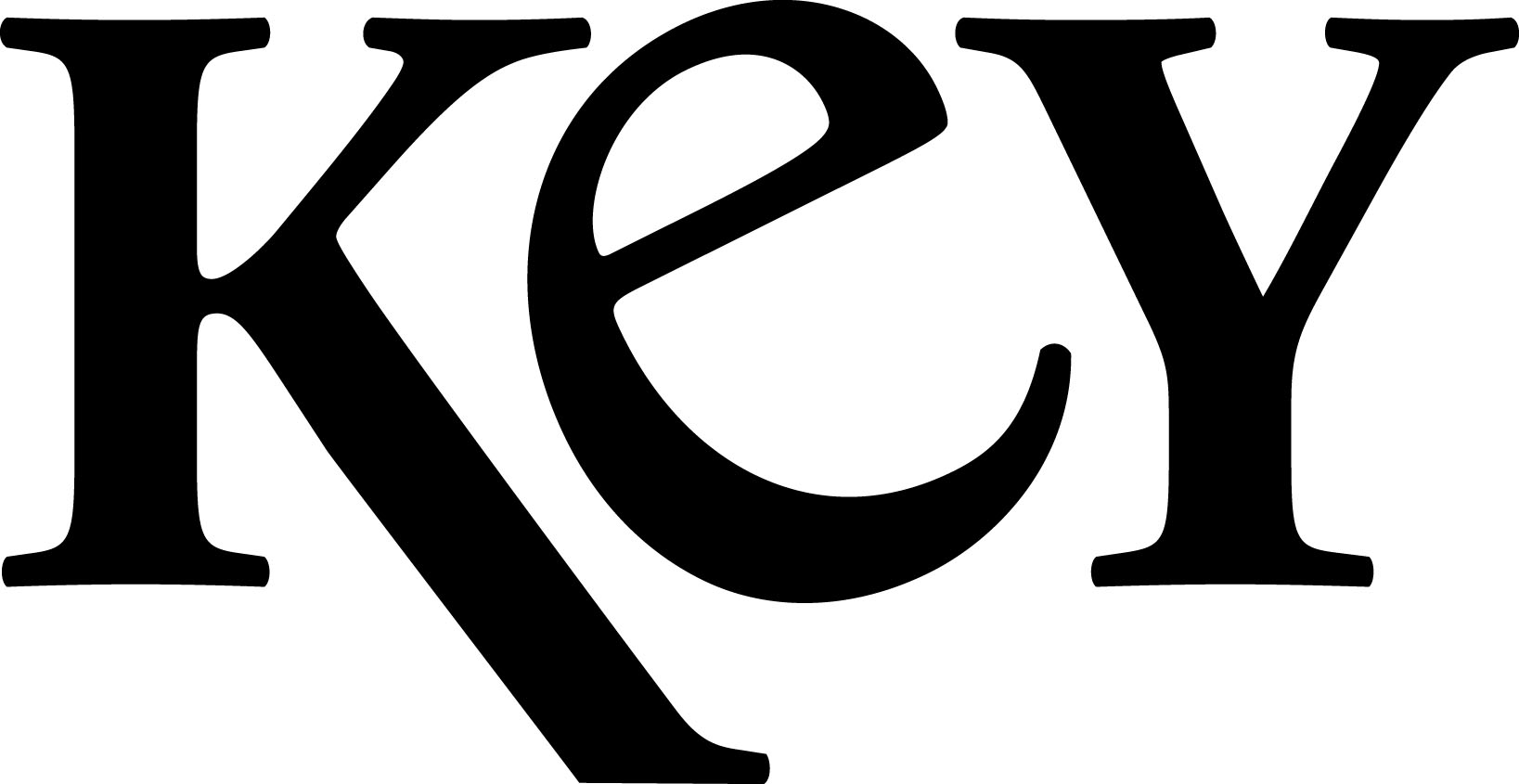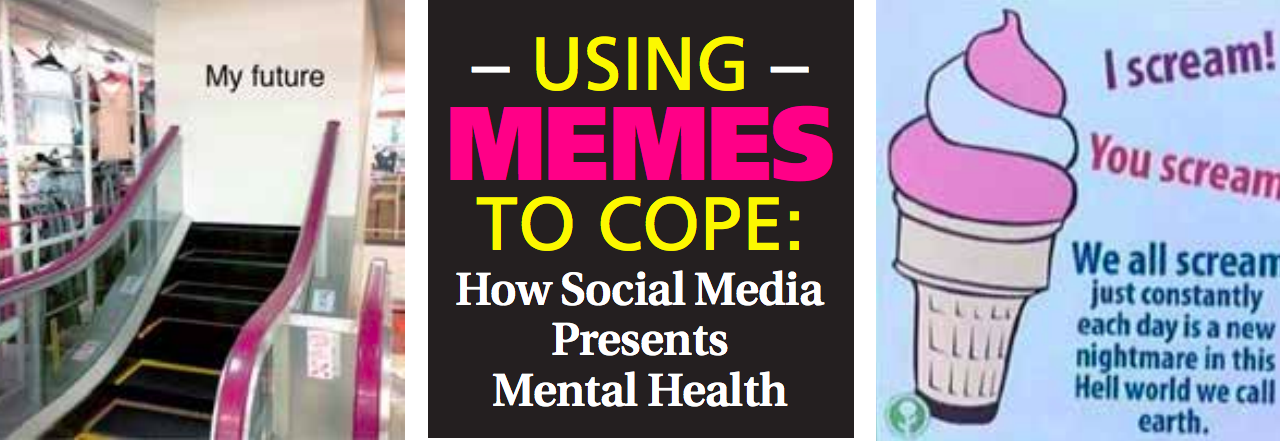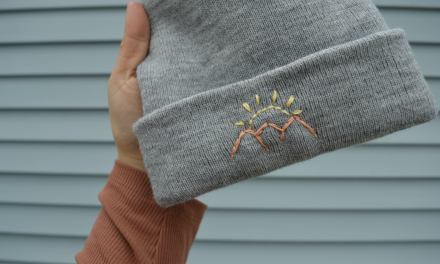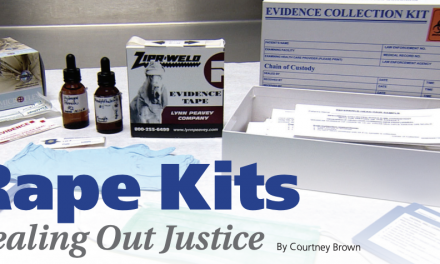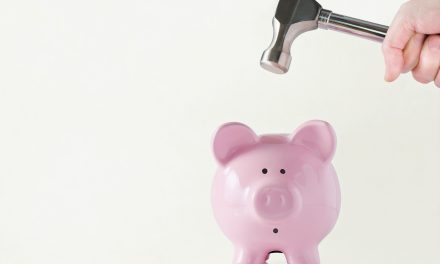
Do you ever see a Facebook friend joking about committing suicide? Do you get concerned they aren’t really joking? This is just one instance of how social media users encounter mental health memes.
Modern trends can be difficult to understand due to their ever-changing nature, but one trend is growing in popularity and simultaneously raising concern: mental health memes. So, what are mental health memes?
The term describes a multitude of memes that center around people relating to their own, or other people’s, mental health problems. Often, the issues discussed are highly specific, yet there are still many people seeking out this content.
More specifically, these posts include content regarding: alcoholism, substance abuse, disassociation, self-harm, hypersexuality, social anxiety, depression and suicidal ideations. The popular subreddit “2meirl4meirl” provides hundreds of pages of examples of this kind of content.
Users post relatable content and often poke fun at their own mental health or other people’s mental health. At the top of this subreddit, there is a pinned post urging people with suicidal ideations to get help.
A mental health meme can include some humor. Those who are not dealing with mental issues may fail to see the humor in them at all. However, even those who are not diagnosed with a mental
health disorder find humor in this online content. “I’m a very sarcastic person. Almost all the time I am sarcastic,” Jacob Clary, junior multiplatform journalism major, said.
“I don’t really want to kill myself. It’s the joke that every college student has where they imagine they’re going to be hit by a car. It’s funny in a way.”
Clary says he does draw the line once things seem to be getting serious, though. He still looks for signs of depression or other mental health issues in his friends.
“I joke about myself because I know I’m not actually depressed. I won’t joke about that kind of stuff with people I don’t know, though, because I don’t know where their ‘line’ is,” he said. Sometimes, the line between “joking” and “not joking” can be difficult to discern.
Especially when someone makes light of their mental health state in an everyday conversation. “Most of the time I really can’t, but I try to judge by what their demeanor is. Sometimes, it can be difficult to tell if someone is joking or not,” Clary said. “If they make it seem like a joke, most of the time, I’ll think of it as a joke, too.”
Sometimes, the line between “joking” and “not joking” can be difficult to discern.
Jokes about mental health have made their way into everyday conversation – but the darker humor is found online.
The popular image-sharing social media platform, Instagram, has thousands of pages devoted to mental health memes.
These Instagram pages have a large following, and their followers tend to engage with the account holders frequently.
Younger people most often manage these accounts, usually those who fall into the millennial age range.
The millennial generation is usually defined as those born between 1980 and 1996.
Some of these accounts are operated by those who fall into “Generation Z,” which includes people born after 1996.

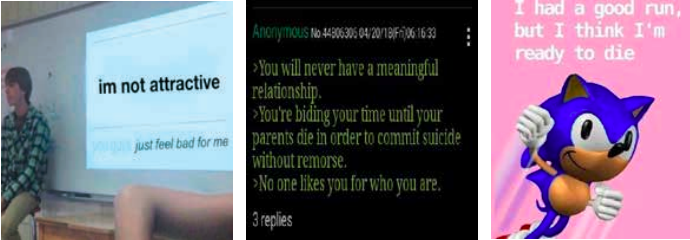
“I’m a very sarcastic person. Almost all the time I am sarcastic.“
– JACOB CLARY
BGSU Junior
Multiplatform Journalism Major
The account owners may reveal their real-life identity, but most choose to post content anonymously.
The Instagram account “drunkaunt420” is run by a 15-year-old high school student who has remained anonymous ever since she created the account during the summer of 2017.
She uses her Instagram account to post highly-specific, relatable memes about her own mental health and her experiences with therapy.
Her Instagram bio reads as follows: “Sad Virgo – Personal Blog. Oversharing!!!!! A lot !!!!!!” This Instagram account had a goal in mind when it was first created.
“I thought that this would be a good way to relate to other people with mental health issues and help myself through a sort of online diary, because a lot of people say that making mental health memes about themselves is therapeutic, and I’ve found that to be true,” drunkaunt420 said.
Drunkaunt420 doesn’t adhere to any specific posting guidelines, so there isn’t necessarily a line for her to cross when making content.
“I honestly don’t have any rules when it comes to making memes, as long as I’m comfortable with what I’m posting,” drunkaunt420 said.
“If my content is extremely graphic or detailed, I put a trigger warning on my posts.” A “trigger warning” is a disclaimer put before a post, or in the description of a post, that lets readers know disturbing content is about to appear.
This allows people to avoid content they may find disconcerting, like posts containing self-harm, depicting symptoms of eating disorders or suicidal ideations. Trigger warnings can extend to a host of other types of content, but usually it is reserved for the aforementioned “extreme” content. Drunkaunt420 has 1,318 Instagram followers, and her account is continuing to grow.
“I think memes about mental health are so popular because, frankly, there are a lot of people with mental health issues. Of course, there are followers who haven’t experienced mental illness, but they’re pretty rare in my experience,” she said. While drunkaunt420 produces a form of media that revolves around mental health issues, she does see some issues with the way mental health is portrayed in the mainstream media.
“Making media about mental health as a whole is tricky because there is always bound to be people who romanticize these things or criticize the ways you’re handling your mental health issues.”
After several months of creating and curating memes about mental health, drunkaunt420 is happy with what her account has become.
For her, confronting her mental illness with humor has been beneficial, despite criticism. “I’ve found making these memes has helped me and made me feel a lot better about the situations I’m in,” she said.
Among the thousands of mentalhealth meme accounts on Instagram, there are some with a larger following than drunkaunt420, like “GarbageCanAesthetic.”
“I’ve found making these memes has helped me and made me feel a lot better about the situations I’m in.“
– DRUNKAUNT420
Anomymous Meme
Instagram account
This account has over 26,000 followers and its bio states “Queens of the Sewer: the female versions of Holden Caulfield and Hamlet – serving hot memes.”
Holden Caulfield is a fictional character in the novel “Catcher in the Rye” who is best described by his teenage angst. GarbageCanAesthetic is run by two 18-year-old girls who felt like Instagram’s…
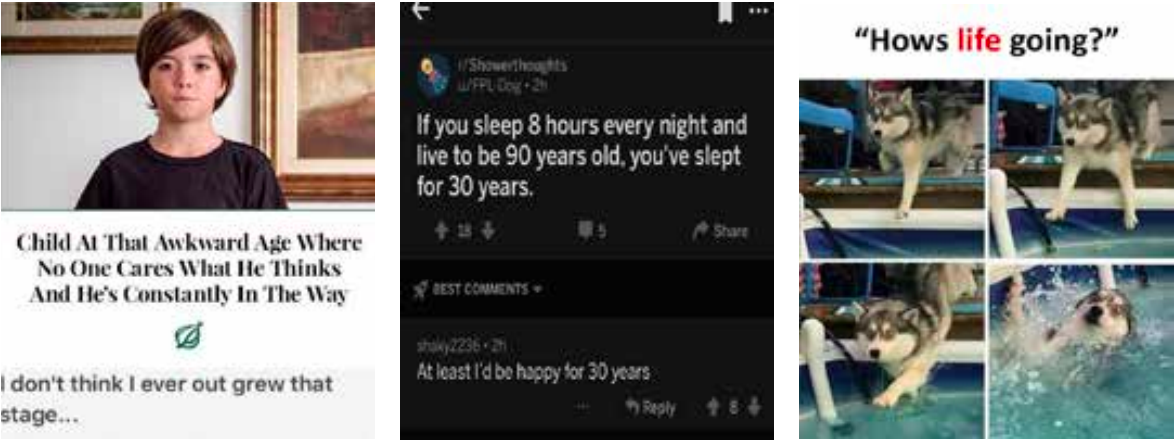
content was something they could both relate to, however, they both wanted to create more specialized content. Their reasoning behind creating this account is similar to drunkaunt420, and they enjoy the interaction they get from their users.
“I honestly view memes about mental illness as methods of coping for a lot of people.“
– GARBAGECANAESTHETIC
Anomymous meme
Instagram account
“I honestly view memes about mental illness as methods of coping for a lot of people,” GarbageCanAesthetic said.
“Mental illness can be gross, and cause people to do gross things, so it’s really comforting to see what you believe is unspeakable put in a comedic light with a bunch of people commenting ‘same’ underneath.”
Dakota Rench, a senior communications major, believes these memes do create the sense of community GarbageCanAesthetic speaks of. It may be as simple as someone commenting “same ” on an Instagram post yet he believes that sense of community is still valid, since the internet provides its users with a way to quickly and cheaply communicate.
“In this day and age, we have had
a rise in evidence for a lot of mental health illnesses that weren’t previously recognized,” Rench said. “When this is established in a society that is able to now accept that and be open about it, the internet is a free way for people to do that.”
Despite talking about such dire issues, memes about mental health are most likely here to stay. In 2017, we have seen a shift from previous societal perceptions of mental health.
People are speaking up about what used to be deemed as unspeakable problems. For example, in the 1990s, gothic culture was often equated with feelings of sadness or apathy. Today, we have seen a resurgence of this culture. Mainstream artists often use this aesthetic to appeal to their audience, such as Melanie Martinez’s album “Crybaby.”
Drunkaunt420 recognizes how some of this content may perpetuate mental illness, but regardless, she believes we can find fault in most things on the internet. Content such of this deserves the same sort of speculation as any other “fact” on the internet.
“If someone hasn’t experienced the things they’re writing about they’re bound to get some facts wrong no matter how extensively they’ve researched it,” drunkaunt420 said. “The same goes for trauma and mental illness.” Joking aside, it is important to get help if one feels like their mental health
is deteriorating, and there is no shame in asking if your friend is in need of help.
The American Foundation of Suicide Prevention offers online chat services and a phoneline where people can reach out for help in their time of need: 1-800-273-8255.
“In this day and age, we have had a rise in evidence for a lot of mental health illnesses that weren’t previously recognized.“
– DAKOTA RENCH
BGSU, Senior
Communications Major

